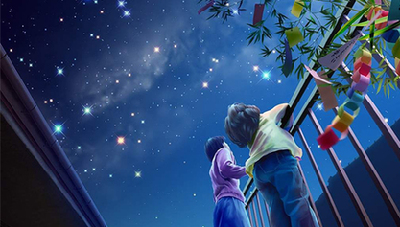The 7th day of the seventh lunar month is a traditional Chinese festival called Double Seventh Day, which is also considered China’s Valentine’s Day. Because main participants in this festival are women, and the main activity of the festival is to plead for skills, the festival is also called Qiqiao Festival, or Young Women’s Day. On May 20th, 2006, Double Seventh Day was put on the list of the first national intangible cultural heritage sites by the State Council of China.
 |
I. Origins of the Double Seventh Day
1. Double-Seventh Day originated from nature worship According to historical literature, records about Altair (represented by the cowherd in the legend) and Vega (represented by the Weaving Girl) had come into being along with the increasing understanding of astronomy and weaving technology of the Chinese at least three or four thousand years ago. The first star of the Big Dipper is called the Kui Star (head star), or Kuishou. Later, the one who gained the first place in the highest imperial civil service examination was called "da kui tian xia shi" (literally, great head of the world scholars); and the Double-Seventh Day is also called "Kuixing (head star) Festival,” or "Shaishu (Basking books) Festival.”
2. Double-Seventh Day was also the product of time worship by the ancients In the Chinese language, "七" (seven) forms a partial tone with "期" (a period of time); the number "七" appears in both month and day, giving a strong sense of time. The number "seven" displays the periodicity of time in the folk wisdom, which usually sets "double seven" as the termination of time. Meanwhile, "七" forms partial tone with "吉,” therefore "double seven,” carrying the meaning of double auspiciousness, is a lucky day. In Taiwan, July is considered the month of most happiness and auspiciousness.
3. "Double Seventh Day" is also an outgrowth of number worship January 1, March 3, May 5, July 7, and September 9 along with February 2 and June 6, altogether seven pairs of date in the lunar calendar, were considered auspicious days by the ancient Chinese. "Seven" is also the number of the beads in each row of the abacus, romantic and precise, giving a mysterious aesthetic feeling. Furthermore, "七" bears the same pronunciation with "妻" (wife), thus the Double Seventh Day is to a great extent a festival related to women.
 |




Why not rent a boyfriend, or girlfriend to please parents during the Spring Festival?